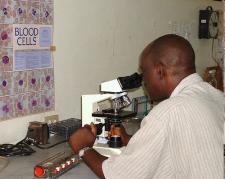You are here: Home » KIT Information & Library Services » ILS Information products » LABORATORY QUALITY STRENGTHENING
KIT Dossier Laboratory quality strengthening
By KIT Biomedical Research
Laboratory results are crucial for the correct diagnosis of many diseases, including the three major high burden infectious diseases in low- and middle-income countries (LMIC): HIV/AIDS, malaria and tuberculosis. Diagnostic decision making based on incorrect or no laboratory results leads to wrong diagnoses, which in turn leads to wrongly diagnosed persons that are prescribed costly medicines or worse: patients not receiving treatment.
Despite the importance of properly functioning laboratories and laboratory networks, the laboratory sector has long been a neglected component of health care strengthening efforts (1-5). Funding for laboratory strengthening activities has lagged behind with grave consequences. Some examples (5-8):
- many LMIC do not have a national laboratory policy
- there is a lack of proper leadership
- there is a scarcity of quality equipment and supplies due to absence of proper procurement and supply chains
- sensitive laboratory equipment is not maintained due to lack of specialized technical support
- there is a lack of adequate laboratory training
- there is a lack of human resources, worsened by a brain drain to high income countries
Fortunately, the awareness for the need to strengthen laboratories in LMIC is rapidly increasing. One of the first signs was the high level recognition in the Maputo declaration that laboratory systems are inadequate and that there is a need to expand and further develop quality-assured laboratory services (9). This recognition was repeated and translated into calls in international meetings in Senegal and Cameroon in 2008, and Rwanda and France in 2009 (10).
Implementing a quality management system that complies with international quality standards is generally perceived as the best way to improve a laboratory. Current laboratory improvement efforts in LMIC focus on implementing such systems in national (reference) laboratories with the aim to get these accredited. However, international quality standards are too resource demanding and too extensive for lower level laboratories in LMIC laboratory networks (e.g. district and peripheral/rural laboratories). Yet, the vast majority of patients is served by these laboratories. The problem is that no alternatives to international quality standards exist that could be used to improve these laboratories.
Moreover, there is a need for formulation and, even more, active enactment of proper national laboratory policies in many LMIC. By having a proper laboratory policy, laboratory improvement efforts can be much better adapted to the needs. An important precondition thereby is that this policy is based on the prevailing needs of the country.
Hence, a lot still needs to be done and much funding and investment of efforts are needed. But with an efficient, consistent and large-scale approach that is based on the needs of the countries, has a sustainable character and is aligned with other capacity strengthening initiatives, this is not an impossible task.
Reference List
- Clinton WJ. Turning the tide on the AIDS pandemic. N Engl J Med 2003 May 1;348(18):1800-2.
- Gayle HD. Curbing the global AIDS epidemic. N Engl J Med 2003 May 1;348(18):1802-5.
- Muula AS, Maseko FC. Medical laboratory services in Africa deserve more. Clin Infect Dis 2006 May 15;42(10):1503.
- Nkengasong JN, Nsubuga P, Nwanyanwu O, Gershy-Damet GM, Roscigno G, Bulterys M, et al. Laboratory systems and services are critical in global health: time to end the neglect? Am J Clin Pathol 2010 Sep;134(3):368-73.
- Petti CA, Polage CR, Quinn TC, Ronald AR, Sande MA. Laboratory medicine in Africa: a barrier to effective health care. Clin Infect Dis 2006 Feb 1;42(3):377-82.
- Cohen GM. Access to diagnostics in support of HIV/AIDS and tuberculosis treatment in developing countries. Aids 2007;21((suppl 4)):S81-S87.
- Kruk ME. Emergency Preparedness and Public Health Systems: Lessons for Developing Countries. Am J Prev Med 2008;34(6):529-34.
- Okeke IN. Diagnostic insufficiency in Africa. Clin Infect Dis 2006 May 15;42(10):1501-3.
- The Maputo Declaration on Strengthening of Laboratory Systems, World Health Organization regional officer for Africa, (2008).
- Gershy-Damet GM, Rotz P, Cross D, Belabbes eH, Cham F, Ndihokubwayo JB, et al. The World Health Organization African region laboratory accreditation process: improving the quality of laboratory systems in the African region. Am J Clin Pathol 2010 Sep;134(3):393-400.

Related item
Snelkoppelingen
Agenda News Press Working at KIT About KIT Cookies Contact
Nederlands -English




